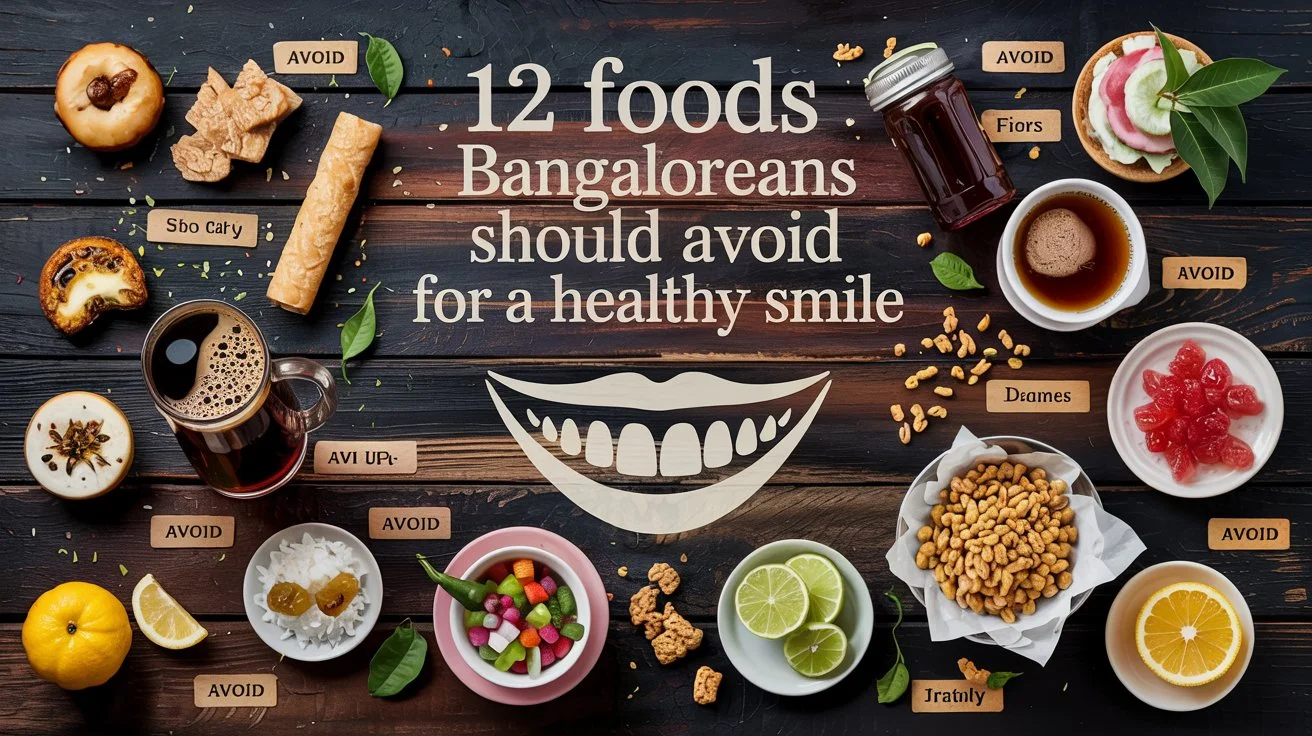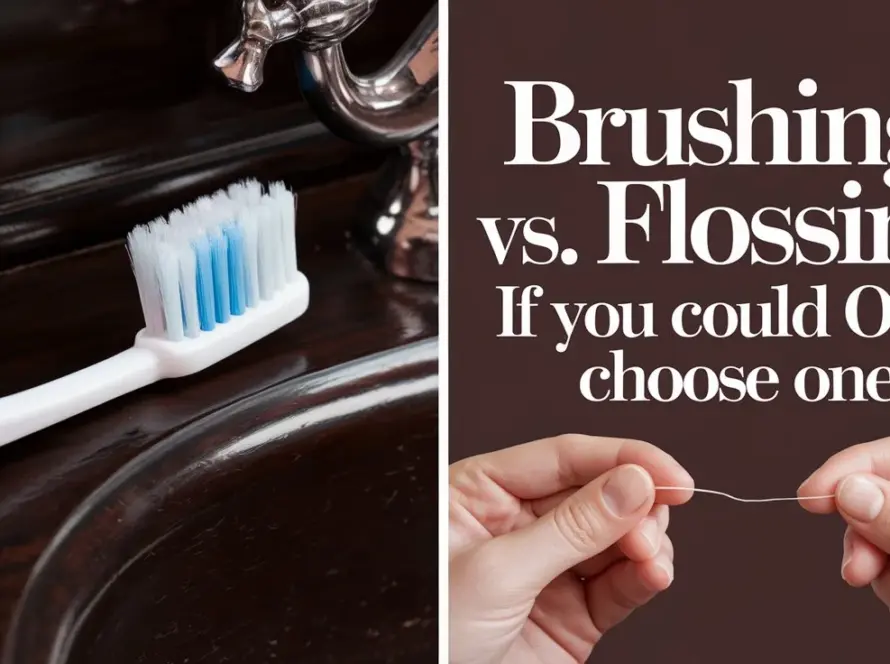Why Diet Matters for Dental Health in Bangalore
In Bangalore’s dynamic food scene—from filter coffee and dosas to fast‑food chains—what you eat and drink has a direct impact on your oral health. Beyond daily brushing and flossing, dietary choices shape the strength of enamel, gum health and even the balance of oral bacteria. Combine Bangalore’s hard borewell water and rising pollution levels with popular local snacks, and you have a recipe for potential tooth decay, sensitivity and staining.
This guide highlights 12 common foods and beverages that can undermine your dental health (or should be consumed in moderation), along with practical tips to help you maintain a bright, healthy smile in the Garden City.
1. Sticky Indian Sweets (Mysore Pak, Chikki)
Why they’re harmful: Traditional sweets like Mysore Pak and peanut chikki adhere to tooth surfaces and settle into crevices, promoting acid‑producing bacteria and accelerating plaque formation.
Additional insight: Many homemade versions use ghee and refined sugar, further softening enamel with each bite.
Protective measures:
- Rinse your mouth thoroughly with water immediately after eating.
- Wait at least 30 minutes before brushing to avoid brushing sugar into softened enamel.
- Consider replacing one festive treat per week with fresh fruit slices to satisfy your sweet tooth.
2. Carbonated Soft Drinks
Why they’re harmful: Both sugar‑sweetened and sugar‑free sodas have a pH below 4, which erodes enamel and increases tooth sensitivity.
Additional insight: Frequent sips throughout the day magnify acid exposure, especially when consumed with meals high in carbohydrates.
Protective measures:
- Drink carbonated beverages only with meals to increase saliva flow.
- Afterward, rinse with plain water or chew sugar‑free gum to neutralize acids.
- Limit intake to special occasions rather than daily consumption
3. Paan, Gutkha and Betel Nut
Why they’re harmful: Areca nut and tobacco build up staining compounds on teeth, promote gum recession and carry carcinogenic risk.
Additional insight: Even herbal paan mixes can contain additives that irritate the gum line.
Protective measures:
- Switch to non‑areca, chemical‑free mouth fresheners like neem or clove.
- Schedule more frequent dental cleanings if you find it difficult to quit.
- Educate family and friends about the long‑term oral cancer risks linked to these habits.
4. Hard Borewell Water & Dental Fluorosis
Why it’s harmful: Excess fluoride in groundwater causes white or brown discoloration and pits on tooth enamel, particularly in children during tooth development.
Additional insight: In severe cases, fluorosis can compromise tooth strength and make enamel more prone to chips.
Protective measures:
- Install a reverse‑osmosis or activated‑alumina filter to reduce fluoride levels at home.
- Use bottled or low‑fluoride water for mixing infant formula and tea.
- If you notice mottled enamel, consult a Bangalore dentist for professional evaluation and cosmetic options like microabrasion or veneers.
5. Pickles & Vinegar‑Rich Foods
Why they’re harmful: High acidity from vinegar, tamarind and salt softens enamel over time, increasing susceptibility to wear and decay.
Additional insight: Homemade pickles may also include food colorings and preservatives that cling to enamel.
Protective measures:
Pair pickles with dairy products—curd, paneer or buttermilk—to balance pH levels in your mouth.
Limit pickle portion to a teaspoon per meal rather than a heaped tablespoon.
Follow up with a sip of water or milk immediately after finishing your meal.
6. Starchy Snacks (Chips, Murukku, Banana Chips)
Why they’re harmful: Starches break down into sugars, feed decay‑causing bacteria and lodge between teeth.
Additional insight: Many commercial snacks contain added flavors and preservatives that can irritate gum tissue.
Protective measures:
- Opt for roasted chickpeas, almonds or pumpkin seeds as crunchy alternatives.
- Always floss or use an interdental brush after snacking.
- Carry a small pack of sugar‑free gum when you’re on the go to stimulate saliva.
7. Excess Coffee and Tea
Why they’re harmful: Tannins in coffee and tea stain enamel; acidity can contribute to erosion. Added sugar compounds the risk of cavities.
Additional insight: Filter coffee often has higher brew strength, making it more staining than regular drip‑style coffee.
Protective measures:
- Drink through a reusable straw to minimize contact with front teeth.
- Rinse or brush your teeth within 30 minutes of consuming your last cup.
- Alternate with green tea, which has lower acidity and offers antioxidant benefits.
8. Oily and Spicy Street Foods
Why they’re harmful: Excess oil can coat teeth and gums, trapping bacteria; spices may irritate sensitive gum tissue.
Additional insight: Street‑food hygiene varies—contaminated ingredients may introduce pathogens that exacerbate gum inflammation.
Protective measures:
- Choose vendors with visible hygiene practices (gloves, clean utensils).
- Carry antiseptic mouthwash or sanitizer wipes to clean your hands before eating.
- Limit fried chaats and choose options like steamed idli‑upma or roasted corn (bhutta) instead.
9. Alcoholic Beverages
Why they’re harmful: Alcohol dries out the mouth, reducing saliva’s protective role; mixers often contain sugar and acid.
Additional insight: Wine—even “dry” varieties—contains organic acids that can etch enamel over time.
Protective measures:
- Pace yourself with a glass of water between each alcoholic drink.
- Avoid sipping on sugary cocktails; choose clear spirits with soda water.
- Rinse your mouth with water or chew sugar‑free gum after drinking.
10. Packaged Juices & Energy Drinks
Why they’re harmful: These often contain added sugars, citric acid and preservatives—all of which can erode enamel and feed harmful bacteria.
Additional insight: “Vitamin‑fortified” drinks can give a false sense of healthiness, leading to overconsumption.
Protective measures:
- Prepare fresh juices at home without added sugar; drink them quickly rather than sipping over long periods.
- Whenever possible, eat whole fruits to benefit from natural fiber and reduced acid exposure.
- Store‑bought juices should be treated like soft drinks—reserve them for special occasions.
11. Ice Cubes & Frozen Desserts
Why they’re harmful: Biting hard ice or frozen sweets can cause micro‑fractures in enamel and aggravate dentin sensitivity.
Additional insight: Flavored ice treats may contain food coloring that further stains enamel.
Protective measures:
- Let ice cubes melt slightly before sipping cold water.
- If you crave frozen treats, choose softer options like kulfi or fruit‑based popsicles.
- Discuss a desensitizing toothpaste with your dentist if you experience sharp pain.
12. Excess Citrus Fruits (Oranges, Sweet Lime)
Why they’re harmful: High citric acid content can soften enamel; juicing removes protective fiber and increases acid contact.
Additional insight: Repeated grazing on citrus segments throughout the day multiplies acid attacks.
Protective measures:
- Consume citrus fruits as part of a balanced meal rather than as stand‑alone snacks.
- Rinse your mouth with water immediately after eating citrus.
- Wait at least 30 minutes before brushing to allow enamel to reharden.
Handling Accidental Exposure
Even with the best intentions, you may occasionally consume a harmful food or drink. If that happens:
- Rinse Immediately with water or an alkaline mouthwash.
- Chew Sugar‑Free Gum for at least five minutes to boost saliva flow.
- Use a Soft‑Bristled Brush when you do brush, to avoid abrading softened enamel.
- Schedule an Extra Check‑Up if you notice sensitivity or new staining.
Bonus Section: Foods That Actually Help Your Smile
Ragi (Finger Millet): High in calcium and phosphorous for enamel repair.
Guava & Carrots: Natural scrubbing action cleans teeth as you chew.
Leafy Greens & Curry Leaves: Provide essential vitamins and natural antibacterials.
Dairy (Curd, Paneer): Neutralize oral acids and strengthen tooth structure.
Sugar‑Free Chewing Gum (Xylitol-Based): Stimulates saliva and inhibits bacterial growth.
Oral Care Routine for Bangalore Residents
- Brush twice daily with fluoride toothpaste, using a gentle, circular motion.
- Floss once every day to remove plaque from between teeth.
- Rinse your mouth after meals—especially after acidic or sticky foods.
- Drink filtered or bottled water to minimize excess fluoride and mineral exposure.
- Visit your dentist in Bangalore at least every six months for professional cleaning and early problem detection.
By avoiding these enamel‑damaging foods and following a disciplined oral care routine, you’ll be well on your way to preserving that confident, radiant smile—no matter what Bangalore’s food scene throws at you.
Conclusion:
In a city as food‑loving as Bangalore, it’s easy to indulge in every tempting snack and beverage—but your teeth can pay the price. By being mindful of sticky sweets, acidic drinks, and other enamel‑eroding culprits, you can still enjoy the flavours you love while safeguarding your oral health. Simple habits like rinsing after meals, choosing tooth‑friendly alternatives, and brushing with fluoride toothpaste will go a long way toward preventing cavities, sensitivity, and staining.
Remember, even the best home care can’t replace professional expertise. Schedule a check‑up with a trusted dentist in Bangalore at least twice a year to catch issues early and keep your smile bright. With conscious eating choices and regular dental visits, you’ll be well on your way to a healthy, confident smile that stands out in Namma Bengaluru.



